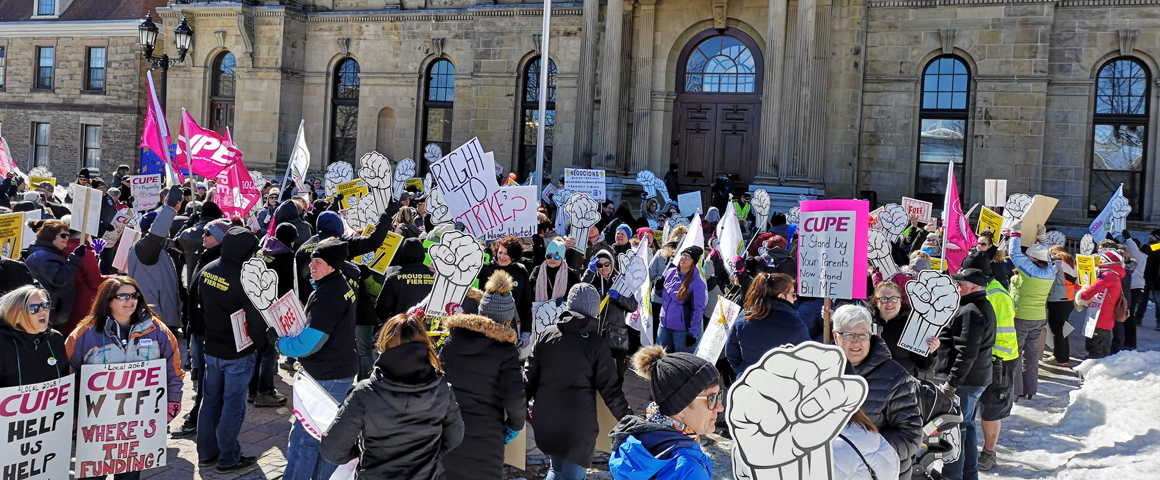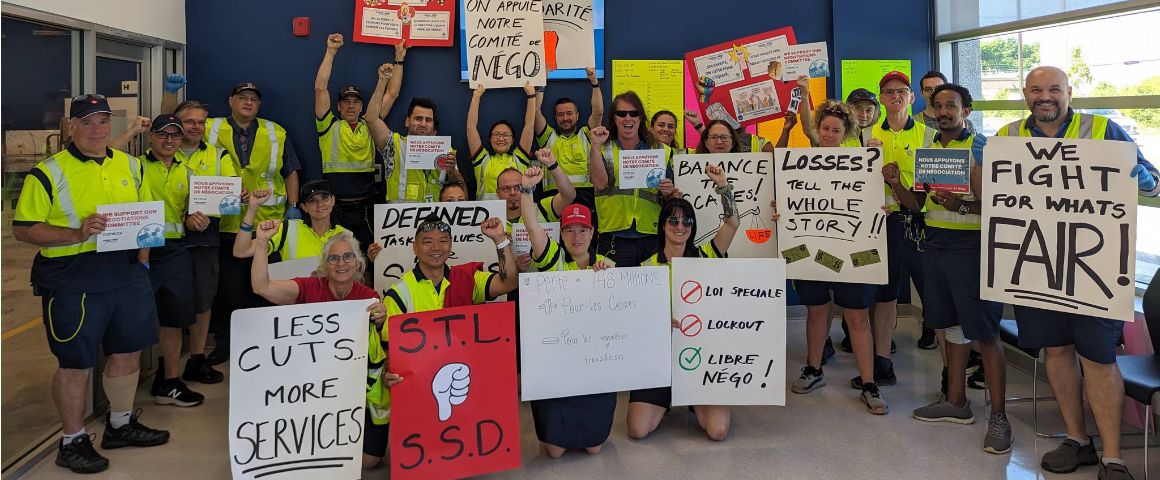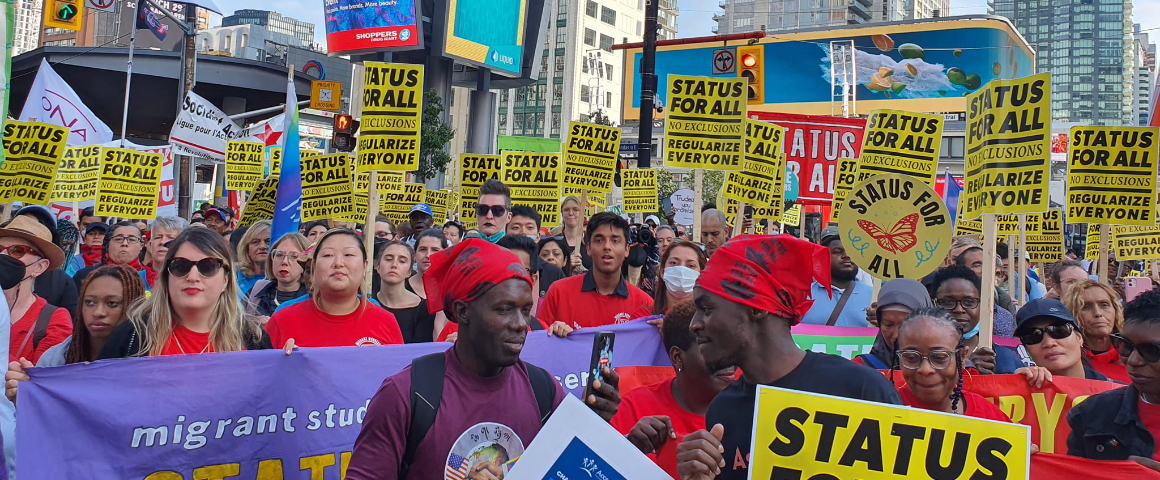By PV staff
Across New Brunswick, public sector workers in the Canadian Union of Public Employees (CUPE) have voted by an impressive 94 percent to strike against the Conservative provincial government of Blaine Higgs. The strike mandate was delivered by voting in ten CUPE locals representing 22,000 workers, nearly 80 percent of the union’s total membership in New Brunswick. The union has said it will not launch a strike before October 22.
The affected workers are from a wide range of jobs including court stenographers, teaching assistants and education support staff, tradespersons, licensed practical nurses and other healthcare and rehabilitation workers.
Higgs was elected to a majority government last year, after calling a snap election during the pandemic. The Conservatives expected the result would give them a clear path to deep austerity and sweeping privatization. But the province’s labour and community movements quickly mobilized to defend public healthcare and win progressive reforms to long-term care.
Now, the unions’ fight is poised to ratchet up several notches. Salaries in the province’s public sector are the lowest in Canada and, as the union says, “CUPE members are the lowest paid of the lowest paid.” Public sector workers in the province have seen their real wages (relative to the cost of living) decline for over 20 years, as successive governments have tabled wage offers that are lower than inflation. As a result, New Brunswick faces a sizeable challenge in terms of recruiting and retaining workers. The situation is particularly bad in the health sector, as added work stresses relating to the pandemic have caused some frontline workers to leave their jobs entirely.
It creates a perfect storm – CUPE workers are frustrated from making a shoestring living while being overworked, and the public is frustrated because of declining service levels.
The union is asking for a five percent annual pay increase, which would lift wages by 20 percent over four years. Their reasoning is that this covers the cost of living plus wages lost through decades of insufficient increases. CUPE NB President Stephen Drost said that the union is “trying to tackle head-on the rising inequalities happening in our province. Workers, unionized and non-unionized, deserve a fair deal from this government.”
In response, the government tabled an initial offer of 3 percent over four years, which it described as “non-negotiable.” At the end of May, the union gave Higgs a 100-day window to bargain a just contract; while the government did increase the wage offer to 5 percent over four years, it also demanded new concessions.
The union understands that improving wages and working conditions is connected to improving public services overall. After Local 1252, representing hospital workers, voted by 94 percent to strike, local President Norma Robinson said, “The membership is clear: they want the Premier to fix our healthcare system, and that starts at the bargaining table.”
CUPE National President Mike Hancock has pledged full support to the New Brunswick workers, noting that the national union has “a strong strike fund.”
It is legal for employers to hire scabs in New Brunswick and CUPE members experienced this last year when they struck at the City of Fredericton. However, after residents of the city angrily rejected the use scabs, management fired them and settled with the union. In the current situation, it is unlikely that the government would be able to hire scabs to replace even a significant portion of 22,000 striking CUPE members.
That hasn’t stopped the Conservatives from going on the attack. While pleading poor at the bargaining table, Higgs has found plenty of public money to spend on anti-union propaganda. Beginning on September 10, the government began to purchase newspaper and radio ads that attack workers and CUPE.
Drost notes that Higgs’ ad campaign goes beyond the borders of the province. “Instead of dealing with the crisis, Premier Higgs is shamefully sending New Brunswicker’s money to US radio stations, such as Q96 in Presque Isle, Maine, to attack NB public service workers part of CUPE. We are all tired of empty promises, inaction on the increased cost of living issues, and wasted tax dollars in anti-union propaganda. Front-line workers have endured so much with so little support, it’s time the government took them seriously. Decades of little to no wage increases, along with a major recruitment and retention crisis, can and must be dealt with at the bargaining table through fair wages.”
The ad campaign has been condemned as an effort to sow division between public sector workers against private sector workers, by comparing CUPE’s wage demands to those of the private sector. Jean-Claude Basque, an organizer with the Common Front for Social Justice, said it is telling that Higgs describes public sector workers as “fat cats” instead of working for improvements for all workers. “Instead of accusing unionized public sector workers of having too much, shouldn’t he be asking why private sector workers have less? Why do thousands of private sector workers have low wages for the most part, no paid sick days, minimal paid vacation, almost no pension funds, little dental or drug coverage? Shouldn’t Higgs be pulling all-nighters to figure out how to improve the lives of these workers and their families instead of trying to deride public sector workers for asking for decent wages and working conditions?”
But Higgs’ anti-union attacks are not limited to ads. On October 8, just days after they voted in favour of strike action, the government moved to transfer nearly 2000 licensed practical nurses (LPNs) out of CUPE and into an entirely different union.
CUPE has denounced the move, with Norma Robinson calling it “union-busting at its worst” and a retaliatory response by the government to the strike vote. “This retribution is an insult to the rights of all healthcare workers to free collective bargaining. Workers told him over and over to fix the staffing crisis at the bargaining table, not through divide and conquer tactics.”
There are also rumours that the government is considering declaring a state of emergency due to the pandemic, which would give the Minister of Public Safety the authority to prohibit CUPE from striking, in at least some sectors. Hospitals in New Brunswick were moved to “Red Alert” on October 12 as a result of the surge in COVID cases.
Meanwhile, the Quebec government is offering New Brunswick nurses signing bonuses of up to $18,000 if they move to Quebec to take up work there. This at a time when New Brunswick’s wait list for a family doctor or nurse practitioner is over 40,000 people.
Clearly, there is a crisis in New Brunswick’s public services which will take a massive fight to fix. At the moment, the best chance lies with 22,000 CUPE members.
[hr gap=”10″]
Get People’s Voice delivered to your door or inbox!
If you found this article useful, please consider subscribing to People’s Voice.
We are 100% reader-supported, with no corporate or government funding.




